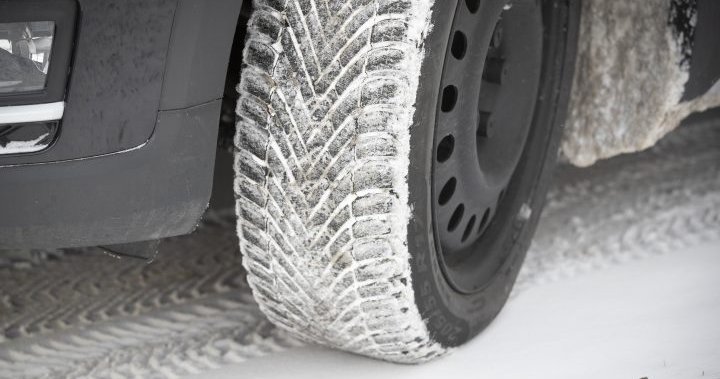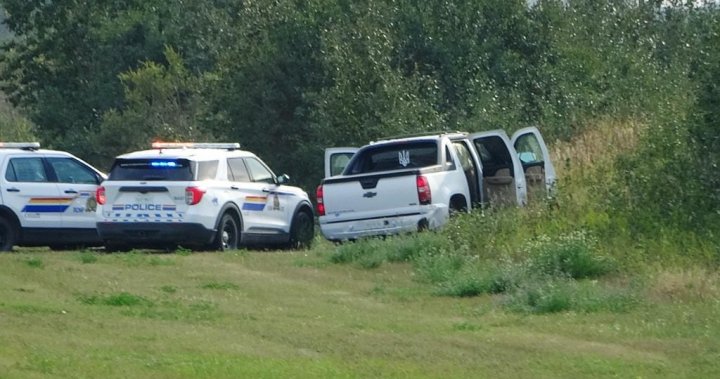Snow and ice aren’t known for making ideal driving conditions in Manitoba. And getting a set of winter tires, while helpful, isn’t cheap.
Jason Dibartolo, the owner of a Fountain Tire branch in Winnipeg, said on average, a set of winter tires at his shop falls in the $1,500 to $1,700 range.
“The tire industry took a pretty big increase just after COVID and during COVID. So, you know, this is now a couple of years later, and I think everyone’s just kind of used to the norm of what pricing is today on all sides of things, (including) food, (and) gas,” he said.
But just as food and gas are essentials, he also considers winter tires essentials.
“They make a tremendous difference in your ability to stop, your ability to turn, obviously accelerate away from a stop,” he said.
“But, when you really come down to it, you really appreciate your tires when you need to make a panic stop, or make a turn (when) you’re looking at that snowbank and you’re not going to make it. Like that’s when they really shine.”
Tara Seel, the media and public relations lead with Manitoba Public Insurance (MPI), said vehicles with winter tires make 6.3 per cent less claims than those without, and 5.7 per cent less severe claims.
“There’s definitely operational benefits to having winter tires,” she said.
Nadia Matos, the external communications manager for CAA Manitoba, said, “It is one of our number one recommendations to get a set of four matching winter tires. They can reduce your braking distance by up to 25 per cent — or two car lengths, depending on the weather.”

Get daily National news
Get the day’s top news, political, economic, and current affairs headlines, delivered to your inbox once a day.
Matos added, “When you consider that the cost of a minor fender bender right now is well over $5,000, then it might be something to consider.”
But these reasons don’t always influence Winnipeggers.
Several people who talked to Global News said they didn’t opt for winter tires this year due to affordability, convenience or comfort level driving on all-seasons or all-weathers.
Experts said winter tires are built with certain materials that make them safest for winter driving, albeit pricier. Differences in research and development also impact the quality and pricing between lower and higher-quality winter tires.
“There’s a measurable difference. Initially, both options, whether it’s entry level or top line, are going to make a big change immediately,” Dibartolo said.
“What you’ll see is that the higher end, and the higher quality, and the bigger brand tires will last longer and they’ll perform better. Some of the lower-level ones will have some of those compounds, but only in the first 20 per cent of the tread.”
To help Manitobans with the cost of decent winter tires, Seel encourages looking into MPI’s financing program called the “Winter Tire Program.”
“Since the inception of the program in 2014, we have given over 240,000 loans to Manitobans,” she said. “We have seen an increase throughout the years.”
Dibartolo’s shop is one of 800 retailers partnering with MPI to deliver the financing program.
“It’s a really, really good program,” he said, especially in the place of a winter tire mandate, like Quebec has. “Daily, we probably process — depending on this time of year — five to 10 (people) per day.”
He said it makes him feel good to see so many people using it, knowing it makes a difference on the road.
“More of them are out there… Our climate requires that, almost. It really, really does. And the way cars come today with what they’re equipped with, they’re not suited for our climate at all,” he said.
According to MPI’s website, to qualify for the Winter Tire Program, someone must be a non-corporate MPI customer, be getting winter tires for a passenger vehicle or light truck, and have no financing restrictions or outstanding payments on their MPI account.
But, whether or not someone has winter tires, CAA Manitoba says common sense is key.
“Winter tires (does) not excuse being distracted at the wheel. It does not excuse going too fast according to the weather conditions,” Matos said.
Dibartolo, Seel, and Matos all agree that while no one can be forced to get winter tires, everyone should be informed and given the chance.
“Some people are very comfortable with what’s on their car and the traction they have, They drive to the conditions. Or, if it’s bad enough, they don’t (speed) up. Then there’s some who are just like, ‘No. I’m scared. I had a close call and I need to make sure that I feel comfortable driving out there,’” he said.
“So, it’s really a personal preference thing, but it makes a big, big difference,” Dibartolo said.
© 2024 Global News, a division of Corus Entertainment Inc.




